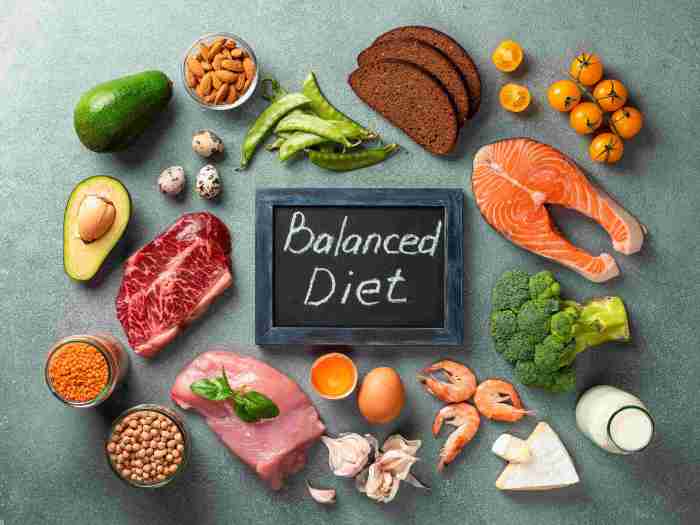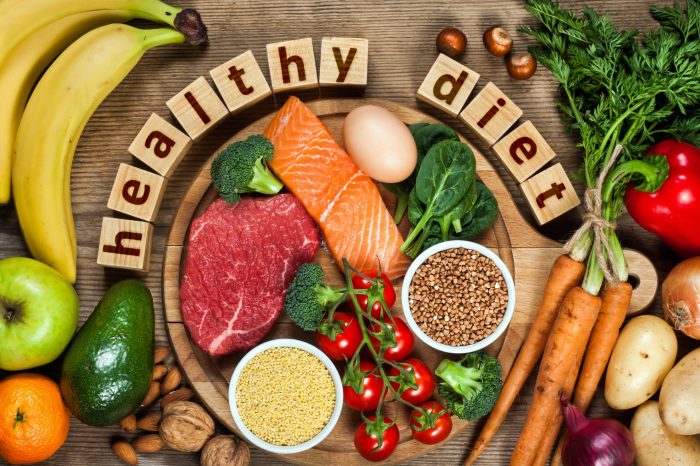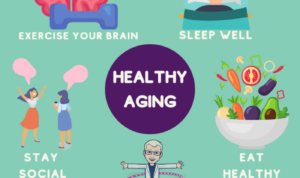Yo, check it – we’re diving into the world of balanced diet, where good vibes and good health collide in a super cool way. Get ready to learn all about how to fuel your body like a boss!
Now let’s break it down and see what this whole balanced diet buzz is all about.
Importance of a Balanced Diet
Maintaining a balanced diet is crucial for overall health as it provides the necessary nutrients and energy that our bodies need to function properly. A balanced diet helps in preventing various health issues and promotes overall well-being.
Key Components of a Balanced Diet
- Proteins: Essential for building and repairing tissues in the body.
- Carbohydrates: Main source of energy for the body.
- Fats: Important for cell growth and protecting organs.
- Vitamins: Help in regulating bodily functions and boosting immunity.
- Minerals: Play a crucial role in various bodily functions and processes.
- Fiber: Aids in digestion and helps in maintaining a healthy weight.
Impact of an Imbalanced Diet
An imbalanced diet can lead to various health issues, such as:
- Obesity: Excessive intake of unhealthy foods can result in weight gain and obesity.
- Heart Disease: High levels of saturated fats and cholesterol can increase the risk of heart disease.
- Diabetes: Consuming sugary and processed foods in excess can lead to diabetes.
- Osteoporosis: Inadequate intake of calcium and vitamin D can weaken bones and lead to osteoporosis.
- Mental Health Issues: Poor diet can affect mental health, leading to issues like depression and anxiety.
Nutrients in a Balanced Diet

Eating a balanced diet means consuming a variety of foods that provide essential nutrients needed for overall health and well-being.
Carbohydrates
Carbohydrates are the body’s main source of energy. They are broken down into glucose, which fuels our cells and provides energy for physical activity. Good sources of carbohydrates include whole grains, fruits, vegetables, and legumes.
Proteins
Proteins are crucial for building and repairing tissues in the body. They are made up of amino acids, which are essential for various bodily functions. Foods rich in protein include lean meats, poultry, fish, eggs, dairy products, and plant-based sources like tofu and legumes.
Fats
Fats are important for energy storage, insulation, and the absorption of fat-soluble vitamins. Healthy fats, such as those found in avocados, nuts, seeds, and olive oil, are essential for brain function and hormone production.
Vitamins
Vitamins are essential for various bodily functions, including immune system support, wound healing, and converting food into energy. Each vitamin plays a unique role in maintaining good health. Sources of vitamins include fruits, vegetables, dairy products, and fortified foods.
Minerals
Minerals are necessary for proper body function, including bone health, fluid balance, and nerve function. Examples of minerals include calcium, iron, potassium, and magnesium. Foods rich in minerals include dairy products, leafy greens, nuts, seeds, and whole grains.
Designing a Balanced Meal Plan
Planning a balanced meal is essential to ensure you are getting all the necessary nutrients your body needs to function properly. Incorporating a variety of foods in appropriate portions is key to maintaining a healthy diet.
Tips for Planning a Balanced Meal
- Include a source of lean protein, such as chicken, fish, tofu, or beans, in each meal.
- Fill half your plate with colorful vegetables and fruits to get a variety of vitamins and minerals.
- Incorporate whole grains like brown rice, quinoa, or whole wheat bread to provide fiber and energy.
- Choose healthy fats from sources like nuts, seeds, avocado, and olive oil.
Portion Control and Moderation
- Aim to eat balanced portions of each food group to avoid overeating and maintain a healthy weight.
- Use smaller plates to help control portion sizes and avoid consuming more than you need.
- Practice mindful eating by listening to your body’s hunger and fullness cues to prevent overeating.
Including a Variety of Foods
- Rotate different types of protein sources to ensure you are getting a variety of amino acids.
- Try new fruits and vegetables regularly to expand your nutrient intake and taste preferences.
- Experiment with different herbs, spices, and seasonings to add flavor to your meals without relying on excessive salt or sugar.
Sample Meal Plans for Different Dietary Needs
| Vegetarian | Breakfast: Greek yogurt with berries and granola Lunch: Lentil and vegetable stir-fry with brown rice Dinner: Roasted vegetable and chickpea salad |
|---|---|
| Vegan | Breakfast: Chia seed pudding with almond milk and fruit Lunch: Quinoa and black bean salad with avocado Dinner: Tofu and vegetable curry with quinoa |
| Gluten-Free | Breakfast: Gluten-free oatmeal with almond butter and banana Lunch: Grilled chicken salad with mixed greens and veggies Dinner: Baked salmon with quinoa and roasted vegetables |
Benefits of a Balanced Diet

Consuming a balanced diet regularly comes with a wide range of benefits that positively impact overall health and well-being. Let’s delve into the advantages of maintaining a balanced diet.
Weight Management
Maintaining a balanced diet can play a crucial role in weight management. By including a variety of nutrient-dense foods such as fruits, vegetables, whole grains, lean proteins, and healthy fats, individuals can control their calorie intake while ensuring they receive essential nutrients. This can help prevent overeating and promote weight loss or maintenance.
Positive Effects on Mental Health
A balanced diet is not only beneficial for physical health but also for mental well-being. Studies have shown that consuming a diet rich in fruits, vegetables, whole grains, and omega-3 fatty acids can help reduce the risk of depression, anxiety, and other mental health disorders. Nutrient-rich foods can support brain function and mood regulation, contributing to overall mental wellness.
Improved Health Outcomes, Balanced diet
Following a balanced diet has been linked to numerous health benefits and improved outcomes. For example, individuals who consume a diet high in fruits and vegetables are at a lower risk of developing chronic diseases such as heart disease, diabetes, and certain types of cancer. Additionally, a balanced diet can help regulate blood sugar levels, cholesterol levels, and blood pressure, leading to better overall health and longevity.



